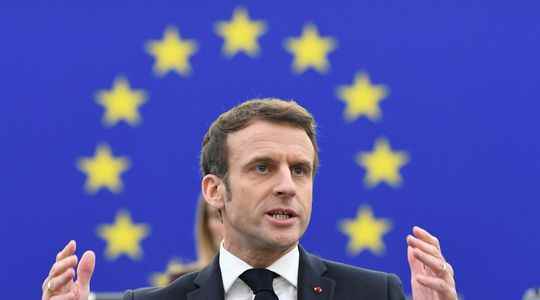To the sound of guns, the European Union responds with… budgets. On the morning of January 24, while London and Washington were sending ammunition to Kiev, placing their troops on high alert while launching the evacuation of their nationals, Brussels draws “a new package of financial aid for Ukraine, consisting of emergency loans and grants”. 1.2 billion euros which will have to be approved by the Council and the Parliament, and will therefore not be completed for several weeks. Not really enough to shake the Kremlin and its 100,000 soldiers already massed all around Ukraine.
Twenty-seven different threat level analyzes
Since the beginning of tensions at the end of 2021, Moscow has made a habit of snubbing Europe and negotiating directly with the United States. Admittedly, Washington deigns to share certain information with the Twenty-Seven, but often with a few days delay. As a result, European diplomacy appears overwhelmed by events, as its representative, Josep Borrell, suggested on Monday noon: “I think we should not dramatize the situation and that we should leave Ukraine, unless the United States provides us with information that justifies this decision.”
The vagueness of Europe is played out above all in the meeting rooms of Brussels. Behind the scenes, there are as many different analyzes of the level of threat as there are EU member countries: the French are seriously worried, the Poles are preparing for war, the Dutch remain on the sidelines… And the Germans no longer know where to turn. Between a Navy chief who publicly boasts of “the respect” that Westerners owe Putin and a disturbing dependence on Russian gas, Olaf Scholz’s coalition seems above all in a hurry to decide nothing. “The German hesitations complicate the situation for the French, who need a clear position from Germany to rally the other Europeans”, underlines Marie Dumoulin, director of the Wider Europe program at the European Council on Foreign Relations (ECFR) .
With the events in Ukraine, Emmanuel Macron could hold his big European moment. For four years, the French president has pleaded for a “powerful Europe”, capable of defending itself alone and of influencing the international scene against the new empires, Russian and Chinese. “In France, we tend to minimize it because of our national political agenda, but the voice of the head of state carries on the continent, relates Jean-Dominique Giuliani, president of the Robert Schuman Foundation. On diplomatic issues and defence, the course of current events proves him right.”
Macron soon on the front line
Chance of the calendar, this “powerful Europe” has never been so necessary, while Paris holds the reins of the presidency of the Council of the EU (PFUE) until June. “In this phase, France bears responsibility for EU cohesion, which may lead it to be less clear-cut in its public positions, suggests Marie Dumoulin. Paris plays a more active role in this and organizes the discussions to reach consensus. As the Élysée indicates, “to be credible against the Russians, our response must be as unified as possible”.
To bring order to this European mosaic, a country must take the lead in the face of threats from the Kremlin. Today, only France, with its large army and vast diplomatic network, seems capable of doing so. Emmanuel Macron must speak directly with Vladimir Poutine in the coming days, when he will have “stalled” the Franco-German position after his visit to Berlin on Tuesday evening, according to the Élysée. “At the moment T, in a situation which can evolve very quickly, the president is convinced that there is still space for diplomacy and de-escalation with Russia, confides a close friend of Emmanuel Macron. the path he will want to show Vladimir Putin during their interview.”
Already, in 2008, the Russian president had found an interlocutor in Paris to get out of an international crisis. At the time, Moscow had entered into a blitzkrieg with Georgia, and France also held the rotating EU presidency. Nicolas Sarkozy had then fully played his role of “president of Europe”, going to snatch a ceasefire in Moscow and Tbilisi. The hyperactive French president did not hesitate to short-circuit Brussels and its endless decision-making process, with obvious success. Fourteen years later, and in the middle of an election period, Emmanuel Macron could be tempted to draw inspiration from it.
